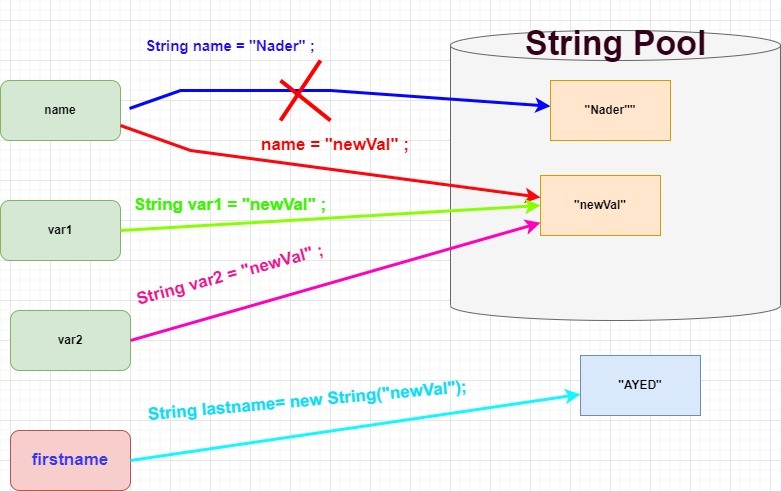Why Are Strings Immutable in Java? Detailed Evaluation for Designers
Why Are Strings Immutable in Java? Detailed Evaluation for Designers
Blog Article
What Is Unalterable Strings and Exactly How It Works
In the world of shows, understanding the principle of unalterable strings is paramount for producing safe and robust applications. Unalterable strings refer to strings that can not be modified after they are created, making certain data integrity and predictability within the code. This basic principle plays a critical duty in numerous programs languages and uses a distinct technique to dealing with data. By checking out the details of exactly how immutable strings function, one can discover a globe of benefits and possibilities that can raise the quality and effectiveness of software program growth.
The Fundamentals of Unalterable Strings
Unalterable strings, as a fundamental principle in programs, are personality series that can not be changed when they are developed. This means that once a string is appointed a worth, that worth can not be changed. In languages like Python and Java, strings are unalterable items, resulting in various implications in regards to memory administration and information integrity.
One of the key benefits of unalterable strings is that they give a sense of safety in data manipulation. Considering that the content of an immutable string can not be modified, it ensures that the original data continues to be intact, decreasing the risk of unexpected modifications throughout program implementation (Why are strings immutable in Java?). This property also simplifies debugging processes, as developers can trust that once a string is specified, its worth will not be accidentally changed
When a brand-new string is created based on an existing one, rather than modifying the initial string, the new worth is saved separately. On the whole, recognizing the basics of unalterable strings is critical for grasping programming principles and optimizing code efficiency.
Advantages of Unalterable Strings
Building upon the safety and performance advantages of unalterable strings, their advantages prolong to boosting code integrity and simplifying concurrent shows tasks. By being immutable, strings can not be customized after creation, which eliminates the danger of unintended changes in the information they store. This fundamental immutability makes sure that once a string is created, its worth remains consistent throughout the program's implementation, lowering the chances of insects caused by unexpected alterations.
Additionally, unalterable strings add to code integrity by making it simpler to reason about the state of a program. Since strings can not be changed, designers can trust that a string will constantly hold the very same worth, streamlining debugging and maintenance initiatives. This predictability leads to more reliable and stable codebases.

Implementation in Programming Languages
Within different programs languages, the unification of unalterable strings is a basic facet that impacts exactly how data is dealt with and adjusted within code structures. The application of immutable strings varies across various shows languages, with each language providing its very own mechanisms to support this concept.

In comparison, languages like C and C++ do not have integrated support for unalterable strings. Programmers in these languages must by hand implement immutability by enforcing guidelines within their code to protect against straight alterations to string things.
Ideal Practices for Collaborating With Immutable Strings
When managing immutable strings in programming languages like Java and Python, sticking to best techniques ensures protected and efficient information control. One of the key finest practices is to use StringBuilder or StringBuffer as opposed to straight manipulating strings, particularly when handling extensive concatenation procedures. These classes supply mutable choices for string manipulation, helping to prevent unnecessary memory allowances and enhancing performance.
Furthermore, when working with sensitive data such as passwords or API secrets, it is crucial to prevent keeping them as simple message in unalterable strings. Using protected storage systems like char varieties or specialized collections for dealing with sensitive information aids alleviate protection threats associated with unalterable strings.
Real-world Applications and Examples
Exploring functional applications of immutable strings in various industries reveals their substantial effect on data stability and system dependability. In the medical care market, immutable strings play a critical duty in ensuring the safety and security and privacy of individual information. By protecting against unapproved adjustments to sensitive info such as clinical records and prescriptions, immutable strings assist preserve conformity with strict personal privacy policies like HIPAA.
Economic organizations additionally take advantage of the unalterable nature of strings to boost the protection of consumer information and purchase documents. Immutable strings assist protect against scams and unapproved alterations to economic information, supplying a durable protection against cyber hazards and making certain the trust and self-confidence of customers.

Final Thought
Finally, unalterable strings are dealt with and stable series of personalities that supply benefits such as thread security and boosted efficiency in programs. They are implemented in various shows languages to make sure information honesty and security. Finest techniques for working with unalterable strings consist of preventing straight alterations and utilizing techniques that return new string things. Real-world applications of immutable strings include information encryption, caching, and string control tasks.
Unalterable strings refer to strings that can not be changed after they are produced, making certain data integrity and predictability within the code. When a new string is produced based on an existing one, rather than modifying the original string, the brand-new value is kept independently.In languages like Java and Python, strings are immutable by default, implying that as soon as a string object is produced, its worth can not be transformed - Why are strings immutable in Java?. Finest methods for working with unalterable strings consist of avoiding direct alterations and utilizing approaches that return new string things. Real-world applications of immutable strings include information file encryption, caching, and string adjustment jobs
Report this page